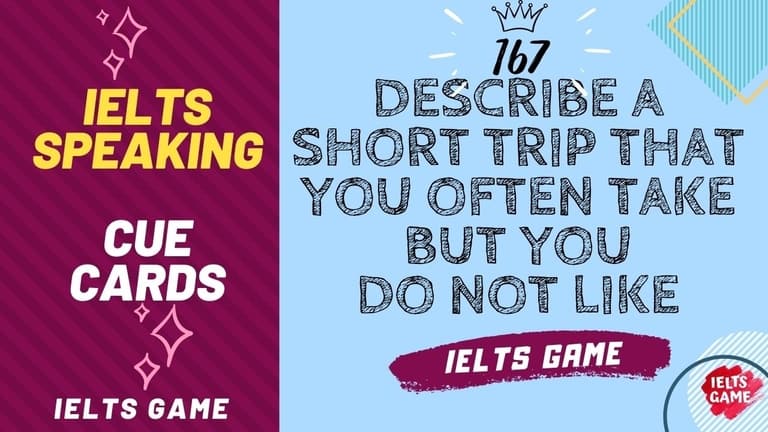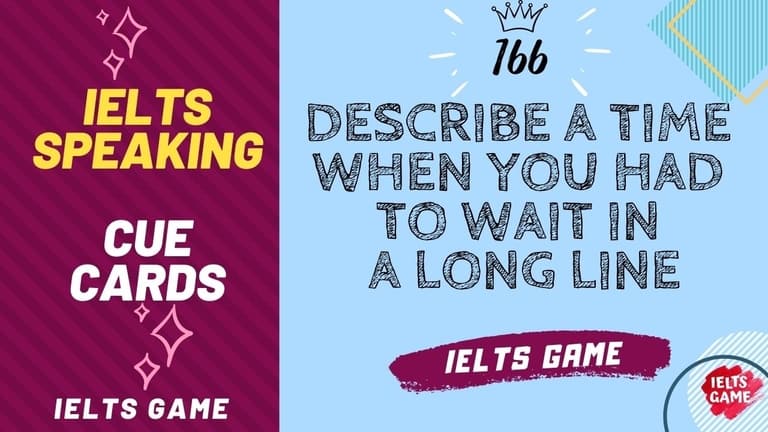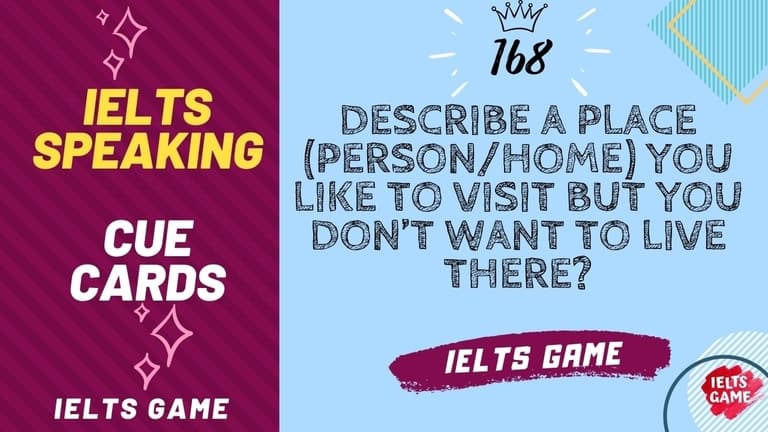167. IELTS Cue Card -
Describe a short trip that you often take but you do not like
In this article, IELTS Game will add number 167 IELTS cue card sample on the series of 2020 cue cards with band 9.0 model answers and part 3 follow up questions that will help you in your IELTS test preparation.
This cue card is related to “Short trip description” topic and asking you to “Describe a short trip that you often take but you do not like“ and asking IELTS speaking part 3 follow up questions.
IELTS Cue Card Sample 167
Describe a short trip that you often take but you do not like.
You should say:
- – where you go?
- – when you go there?
- – why you go there?
- – and explain why you do not like this trip?
Band 9.0 Sample Answer Ideas.
• I live in Phagwara, but I have joined a weekend computer course at Jalandhar.
• I have enrolled for this course at a very prestigious Institute as it will help me to get a good certificate and eventually a job.
• So, every Saturday morning I have to wake up at 5:30 and start by 6:30 a.m. from my home.
• Most of the time I wake up late because I don’t like getting up early at the weekends.
• Distance between the two cities is not much, but there is a lot of traffic on this road and to make the matters worse there are a lot of flyovers that are under construction.
• Last year I used to travel by public transport, but now due to covid-19 restrictions I have to drive my own car and most of the time I get stuck in a traffic jam.
• Whenever I get stuck, I normally miss the first half an hour or at least 15-20 minutes of my class
• Invariably, I get stuck at one bottleneck of the traffic or another
• Another thing that I do know like about this journey is that when people are aware that traffic is not moving, they start honking.
• When I hear the loud horns, I start having a headache and I feel irritated.
• Sometimes the idle engines at the traffic lights also create a lot of noise and the emissions from the engine spoil my morning peace.
• My course will finish in March and I am waiting for the day I sit for my exam
• It will be such a big relief as I will not have to make this journey every weekend again.
IELTS Speaking part 3 Follow Up Questions.
Here are some follow up questions you may be asked during part 3 IELTS Speaking exam by the IELTS examiner related to 1st cue card:
“Describe a short trip that you often take but you do not like”
1. Do Indian people like to travel abroad?
Yes, Indian people like to travel and explore a lot. Indian travelers have been traveling to various countries in Southeast Asia and Europe for many centuries. Now the youngsters have more disposable income so they make short trips to different countries with their friends.
2. How much time do you think people should spend on a trip abroad?
Well! it depends on the purpose of the trip.
Sometimes if it is an excursion it can be just two three days or maybe a week but when you have visited a country to study its culture you may have to stay there for months. On average I think 2 weeks are enough to visit a country.
3. Who prefers traveling abroad, the young or the old?
The young and the old both love to travel abroad, provided there are no health issues for the older people and there is enough funding for young ones.
In my family, my father makes a trip abroad every year.
Sometimes he visits to meet my siblings residing there and on other occasions just to see another country. My younger brother also makes frequent trips abroad. So I think we all love to travel
abroad regardless of age.
4. Which is better for knowing more about a country traveling or reading books about it?
Definitely, there is no better learning than traveling. When you travel to a new country you can soak in the culture, learn a language, try the cuisine, and get a first-hand experience.
As compared to this when you read a book, you are getting a secondhand experience and you are visualizing or imagining the details narrated by another person or another author.



